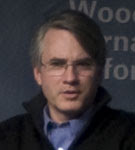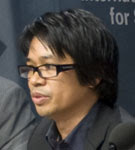Showing posts from category *Main.
-
In Uganda, First Trip for Journalists Bolsters International Reporting
›March 24, 2009 // By Will Rogers U.S. journalists “are by and large dying for the opportunity to go overseas and learn about a whole range of issues, from refugees to human rights,” but often lack the support of their editors—the “gatekeepers”—to do so, said Louise Lief, deputy director of the International Reporting Project (IRP), at a February 26, 2009, event, “Reporting From Uganda: U.S. Media Cover Health, Environment, and Security.” Leif was joined by Paul Hendrie, department editor at Congressional Quarterly (CQ); David Rocks, senior editor at BusinessWeek; and Ben de La Cruz, a staff video journalist at The Washington Post, to discuss the recent IRP Gatekeeper trip to Uganda.
U.S. journalists “are by and large dying for the opportunity to go overseas and learn about a whole range of issues, from refugees to human rights,” but often lack the support of their editors—the “gatekeepers”—to do so, said Louise Lief, deputy director of the International Reporting Project (IRP), at a February 26, 2009, event, “Reporting From Uganda: U.S. Media Cover Health, Environment, and Security.” Leif was joined by Paul Hendrie, department editor at Congressional Quarterly (CQ); David Rocks, senior editor at BusinessWeek; and Ben de La Cruz, a staff video journalist at The Washington Post, to discuss the recent IRP Gatekeeper trip to Uganda.
President Museveni’s Surprising Views
“One of the advantages of these trips is when you go with a critical mass of 12 very senior editors…you can often get in to see the head of state,” said Leif, describing the group’s sit-down interview with President Yoweri Museveni of Uganda. One “big surprise for me was President Museveni’s views on population,” which he did not consider a challenge, said Lief, despite the country’s high total fertility rate of 6.7 children per woman.
She was heartened that the country’s poor infrastructure, including bad roads and unreliable electricity, did not deter Ugandan children from obtaining an education. “All along the road in brightly colored clothing there were thousands and thousands of children,” she said. “Some of them were walking for kilometers, but they were going to school.”
Organic Farmers Fight DDT in Uganda
“These things that we deal with in Washington every day have a real impact in the real world,” said CQ’s Paul Hendrie. He wrote a story on the Ugandan debate over using the pesticide DDT to combat the country’s significant malaria problem. “As one expert put it to me, ‘Farmers love DDT because it kills everything,’ and that’s why it was so popular”—and why it was banned in the United States.
“Uganda has developed an industry, a fledgling industry, of certified organic farmers. They’re the leading organic exporter in Africa and thirteenth in the world,” explained Hendrie. Farmers are concerned “that if traces of DDT are found in these products, they’ll be shut out of markets, especially in Europe, their biggest market.”
“It’s kind of ironic then that in Uganda now, today, the fight against the use of DDT is not being so much led by environmentalists as by farmers, and specifically organic farmers,” Hendrie noted.
Investigating Uganda’s Economy “In a developing country, what is it that moves people, that makes the economy grow?” BusinessWeek’s David Rocks wondered before visiting Uganda.
“In a developing country, what is it that moves people, that makes the economy grow?” BusinessWeek’s David Rocks wondered before visiting Uganda.
“One of the companies that struck me was Kiwi Shoe Polish,” he said. Many people keep their shoes “for 10 or 15 years, so you have to keep them shined and polished and in good shape in order to use them.” But Chinese companies have begun counterfeiting the polish, causing Kiwi’s sales to plummet 50 percent in the last year. “It’s the poorest of the poor who are getting ripped off,” he said.
“I think that there is a lot of room for interesting economic and business stories to be done from Africa,” said Rocks, who is a senior editor at the magazine. “I hope to get my people to do more and more of that.”
Seeds of Peace in the IDP Camps
“The focus of my reporting was basically on security issues in the north, in the Gulu region, where there’s been a 20-year civil war,” said Ben de la Cruz, who filmed several videos for The Washington Post documenting the dangers of life in Uganda’s internally displaced persons (IDP) camps. In the online multimedia presentation “Seeds of Peace,” IDPs tell their wrenching stories, and peace mediator (and former Wilson Center Scholar) Betty Bigombe provides historical and political context on Uganda’s civil war.
“Despite the two years of relative peace, lots of people are still living in the camps and are afraid to leave,” de la Cruz explained. “There’s a huge fear factor because of Joseph Kony’s rebels—even though they had a ceasefire, they’re always afraid he’s going to come back.”Photos: From top to bottom: Louis Lief, Paul Hendrie, David Rocks, and Ben de la Cruz. Courtesy of Dave Hawxhurst and the Woodrow Wilson Center.
-
Water a National Security Issue, Says Senator Richard Durbin
›March 20, 2009 // By Will Rogers “Water access is no longer simply a global health and development issue; it is a mortal and long-term threat that is increasingly becoming a national security issue,” said Senator Richard Durbin at a March 17, 2009, event on Capitol Hill. Introducing the Paul Simon Water for the World Act of 2009, Senator Durbin called for renewed American leadership on the global water crisis plaguing billions around the world.
“Water access is no longer simply a global health and development issue; it is a mortal and long-term threat that is increasingly becoming a national security issue,” said Senator Richard Durbin at a March 17, 2009, event on Capitol Hill. Introducing the Paul Simon Water for the World Act of 2009, Senator Durbin called for renewed American leadership on the global water crisis plaguing billions around the world.
“The United States needs to do much more to ensure that global water access is protected and expanded,” he said. Senator Durbin’s remarks come on the heels of the Fifth Global Water Forum held in Istanbul, Turkey this week, and precede UN World Water Day on March 22, 2009.
“The global water crisis is a quiet killer,” Durbin said. “In the developing world, 5,000 children die every day from easily preventable water-related illnesses such as cholera, typhoid, and malaria, diseases that have been all but eradicated in wealthier nations.”
The Water for the World Act of 2009 expands a commitment from the earlier Paul Simon Water for the Poor Act of 2005, which has had notable success in focusing U.S. aid on water-related assistance. From 2007-2008, for instance, the U.S. helped provide 2 million people with access to an improved source of drinking water and more than 1.5 million people to improved sanitation.
But these efforts need to be scaled up to reach the billions of people without clean water. According to Representative Earl Blumenauer, speaking at the same event, there are more people in the world today without access to adequate sanitation than the populations of China and India combined. The Water for the World Act of 2009 will seek to provide “100 million people around the world with sustainable access to clean water and sanitation by 2015,” said Durbin.
In addition, if passed, the act will make water a development priority for U.S. foreign assistance and “designates within the State Department a high-level representative to ensure that water receives priority attention in our foreign policy, and establishes a new Office of Water at USAID to implement development assistance efforts related to water,” Durbin said.
Access to clean water and adequate sanitation is a cornerstone for sustainable development around the world. Developing countries will not be able to build their economies or bring their resources to fruition if people in these countries have to travel for hours to find water, or are “too sick from drinking unsafe water, to work or to go to school,” Durbin warned.
Improving access to safe water will not only reduce mortality from waterborne illness, but will help provide long-term stability in countries that suffer from population pressures due large population growth from high total fertility rates. In developing countries, 3,900 children under 5 years old die every day from waterborne illness. “Mothers who fear the deaths of their children bear more, in a desperate race against the odds,” said Senator Durbin. While access to education and family planning programs is also essential to reducing high fertility rates in developing countries, so too is basic access to safe drinking water and sanitation.
But funding for water infrastructure and sanitation programs is just the first step. In developing countries, poor governance is a major roadblock to implementing successful development projects. Unregulated privatization of water can prevent the “voiceless and powerless” poor from gaining access to the water services they need, Durbin cautioned.
To address the challenges of governance, the bill will help “build the capacity of poor nations to meet their own water and sanitation challenges,” Durbin said, by providing “technical assistance, best practices, credit authorities, and training to help countries expand access to clean water and sanitation.”
Working to ensure access to safe water and adequate sanitation can help implement the “smart power” strategy the U.S. desperately needs during a period when the world is redefining America – a strategy to help provide “things people and governments in all quarters of the world want but cannot attain in the absence of American leadership,” writes the Center for Strategic and International Studies (CSIS) Commission on Smart Power.
CSIS President John Hamre said the U.S. should re-establish its moral leadership in the world by making a serious commitment to increasing access to clean water and adequate sanitation. CSIS recently issued a Declaration on U.S. Policy and the Global Challenge of Water, endorsed by more than 35 leaders in business, government, and academia, and called on President Obama “to launch a bold new U.S. campaign to address the global challenge of water.”
“Throughout history, civilized nations have put aside political differences to address compelling issues of life and survival,” said Senator Durbin. “Our generation owes the world nothing less.”
Photo: Senator Richard Durbin. Courtesy of the Office of Senator Richard Durbin. -
Weekly Reading
›Arab Environment: Future Challenges, the 2008 report of the Arab Forum for Environment and Development, addresses a wide range of issues, including desertification, urbanization, water resources, waste management, air quality, climate change, and the environmental impact of conflict.
Water: A Global Innovation Outlook Report, distills insights from several of IBM’s “deep dives” on water and business, agriculture, infrastructure, and data.
“Securing Our Future: Environmental Security in Mongolia,” a YouTube video from the Asia Foundation, highlights the Foundation’s efforts to ensure that mining in Mongolia protects human and environmental health.
The Economist examines competing claims to land in Peru, where concessions for mining and oil and gas exploration are often “superimposed on towns, farms and natural parks.”
The Washington Post reviewed Sex and War: How Biology Explains War and Offers a Path to Peace this week. Author Malcolm Potts presented the book at the Wilson Center last month, and discusses the themes in a short YouTube video. -
VIDEO: Avner Vengosh on Radioactivity in Jordan’s Fossil Groundwater
›March 18, 2009 // By Wilson Center StaffIn Jordan, “we investigated about forty wells, and in a large number of them we found high levels of naturally occurring radium,” says Avner Vengosh in this short expert interview from the Environmental Change and Security Program (ECSP). “Several studies have shown that long-term exposure to this element in drinking water would increase the probability of bone cancer and leukemia,” and “millions of people are potentially going to be exposed to this level of radium,” he warns. In this short video, ECSP visits Vengosh, associate professor of earth and ocean sciences at Duke University, on location in Durham, North Carolina. Vengosh discusses his recent discovery of naturally occurring radioactivity in Jordan’s fossil groundwater at levels up to 2000 percent higher than the international drinking-water standard.
To learn more about the naturally occurring radioactivity in Jordan’s fossil groundwater, read Vengosh’s original article, “High Naturally Occurring Radioactivity in Fossil Groundwater from the Middle East,” in the peer-reviewed Environmental Science and Technology. -
VIDEO: Gidon Bromberg on the Jordan River Peace Park and the Good Water Neighbors Project
›March 13, 2009 // By Wilson Center StaffThe Jordan River Peace Park will help “rehabilitate the river, create economic opportunities for communities on both sides of the river’s banks” and serve “as a concrete example of peacebuilding,” says Gidon Bromberg in this short expert analysis from the Environmental Change and Security program. In this short video, Bromberg, co-director of Friends of the Earth Middle East (FoEME) – which recently received the Skoll Award for Social Entrepreneurship – explains how the new Jordan River Peace Park will help build peace by bringing together Jordanian, Israeli, and Palestinian environmentalists.
To learn more about the Jordan River Peace Park, please visit: -
Weekly Reading
›The UN Population Division updated its population predictions through 2050 this week, and global population is now expected to surpass 9 billion by 2050, with most of this growth occurring in developing countries. Andrew Revkin of the New York Times reflected on the findings on his Dot Earth blog.
Although many of Rwanda’s national development policies recognize the links between population, health, environment, and poverty, actually implementing cross-sectoral collaboration remains challenging. A new policy brief from the Population Reference Bureau examines prospects for—and progress in—integrating these sectors. For more on population, health, and environment in Rwanda, read Rachel Weisshaar’s from-the-field dispatches on the New Security Beat.
“Population growth, climate change and demand for greater food and energy supplies are squeezing global water supplies, according to a new U.N. report,” says the New York Times/Greenwire. The report, Water in a Changing World, will be officially launched at the World Water Forum in Istanbul on March 16, 2009.
Karen Hardee and Kimberly Rovin discuss how population affects Ethiopia’s ability to adapt to climate change and increase its citizens’ food security in an article for peopleandplanet.net.
The Canadian Broadcasting Company’s The Current examines the global politics of water in a season-long series entitled “Watershed.” Recent episodes have highlighted desalination in Israel, collapsing fisheries in Nova Scotia, and Karachi’s black market in water. -
VIDEO: Gidon Bromberg on the Good Water Neighbors Project
›March 13, 2009 // By Wilson Center Staff
“Water resources in our part of the world are shared. There is no major source of water that does not cross one or more political boundaries,” says Gidon Bromberg in this short expert analysis from the Environmental Change and Security Program. “Therefore there is this natural interdependence between countries – but more obviously between communities.” And the Good Water Neighbors project uses that “rationale of interdependence to help create trust; to solve livelihood problems that our communities face.” In this short video, Bromberg, a 2008 Time Magazine Hero of the Environment, discusses the Good Water Neighbors project, one of the innovative cross-border initiatives of this award-winning NGO. -
New UNEP Report Explores Environment’s Links to Conflict, Peacebuilding
›March 10, 2009 // By Will Rogers “Integrating environment and natural resources into peacebuilding is no longer an option—it is a security imperative,” says a new report from the UN Environment Programme (UNEP), From Conflict to Peacebuilding: The Role of Natural Resources and the Environment (to be launched by Achim Steiner, executive director of UNEP, at a March 24, 2009, event at the Wilson Center). A joint product of UNEP and UNEP’s Expert Advisory Group on Environment, Conflict and Peacebuilding, the report was co-authored by Richard Matthew of the University of California, Irvine, Oli Brown of the International Institute for Sustainable Development, and David Jensen of UNEP’s Post-Conflict and Disaster Management Branch. Though environmental conditions are rarely – if ever – the sole precipitator of violent conflict and war, they do play an important role as a “threat multiplier which exacerbates existing trends, tensions and instability” that can ultimately lead to conflict.
“Integrating environment and natural resources into peacebuilding is no longer an option—it is a security imperative,” says a new report from the UN Environment Programme (UNEP), From Conflict to Peacebuilding: The Role of Natural Resources and the Environment (to be launched by Achim Steiner, executive director of UNEP, at a March 24, 2009, event at the Wilson Center). A joint product of UNEP and UNEP’s Expert Advisory Group on Environment, Conflict and Peacebuilding, the report was co-authored by Richard Matthew of the University of California, Irvine, Oli Brown of the International Institute for Sustainable Development, and David Jensen of UNEP’s Post-Conflict and Disaster Management Branch. Though environmental conditions are rarely – if ever – the sole precipitator of violent conflict and war, they do play an important role as a “threat multiplier which exacerbates existing trends, tensions and instability” that can ultimately lead to conflict.
Environmental factors can play a pivotal role along all points of the conflict continuum—from the outbreak of conflict, to the perpetuation of conflict, to the collapse of peace and return to violence. “Attempts to control natural resources or grievances caused by inequitable wealth sharing or environmental degradation can contribute to the outbreak of conflict,” the report says. In Darfur, for example, “water scarcity and the steady loss of fertile land are important underlying factors” that have combined with ethnic rivalry, human and livestock population growth, and weak governance to contribute to conflict.
Exploitation of natural resources also played a substantial role in financing and sustaining conflicts in Sierra Leone, Liberia, Angola, and Cambodia, “transforming war and insurgency into an economic rather than purely political activity.” Economic incentives to control valuable natural resources can reinforce political fragmentation, derail a peace process, and even “undermine genuine political reintegration and reconciliation” after peace has been forged.
Not only can natural resources help precipitate violence, conflict can also affect natural resources, destroying people’s livelihoods and perpetuating the conflict cycle. During conflict, the environment can be transformed into a weapon of war that can endanger human health and disrupt and destroy livelihoods—as when wells are poisoned or crops are burned, for example. Environmental destruction disrupts “normal socio-economic patterns,” forces “populations to adopt coping strategies, and often leads to internal displacement or migration to neighboring countries.” And conflict can erode or destroy state institutions and civil society, exacerbating grievances (or creating new ones) and furthering the resource exploitation that fuels the conflict.
Successful peacebuilding therefore requires that “environmental drivers are managed, that tensions are defused, and that natural assets are used sustainably to support stability and development in the long term.” According to the report, successfully integrating natural resource and environmental issues into conflict prevention and peacebuilding strategies requires the United Nations and international community to:- Improve the capacity for early warning and action “in countries that are vulnerable to conflict over natural resources;”
- Implement economic sanctions and develop new legal strategies to improve “oversight and protection of natural resources during conflicts” to minimize their use in financing and sustaining conflict;
- Address natural resource and environmental issues in the initial peacemaking and peacekeeping processes;
- Incorporate natural-resource and environmental issues into integrated peacebuilding strategies in order to avoid a relapse into conflict;
- Help countries use their natural resources to promote economic growth, while practicing good governance and environmental sustainability; and
- Promote confidence building and cooperation between conflicting groups that have shared interests over natural resources and the environment.


 U.S. journalists “are by and large dying for the opportunity to go overseas and learn about a whole range of issues, from refugees to human rights,” but often lack the support of their editors—the “gatekeepers”—to do so, said Louise Lief, deputy director of the International Reporting Project (IRP), at a February 26, 2009, event, “
U.S. journalists “are by and large dying for the opportunity to go overseas and learn about a whole range of issues, from refugees to human rights,” but often lack the support of their editors—the “gatekeepers”—to do so, said Louise Lief, deputy director of the International Reporting Project (IRP), at a February 26, 2009, event, “
 “In a developing country, what is it that moves people, that makes the economy grow?” BusinessWeek’s David Rocks wondered before visiting Uganda.
“In a developing country, what is it that moves people, that makes the economy grow?” BusinessWeek’s David Rocks wondered before visiting Uganda.
 “Water access is no longer simply a global health and development issue; it is a mortal and long-term threat that is increasingly becoming a
“Water access is no longer simply a global health and development issue; it is a mortal and long-term threat that is increasingly becoming a  “Integrating environment and natural resources into peacebuilding is no longer an option—it is a security imperative,” says a new report from the UN Environment Programme (UNEP),
“Integrating environment and natural resources into peacebuilding is no longer an option—it is a security imperative,” says a new report from the UN Environment Programme (UNEP), 

